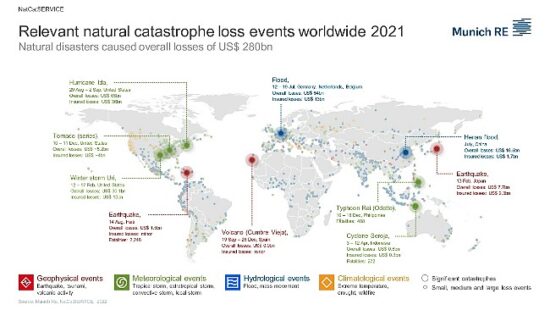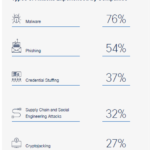Munich Re and Swiss Re are reinsurers. In other words, they underwrite insurance companies that offer policies to homeowners and businesses. Both companies have departments focused on climate change impacts. And what they are reporting for the year that has just ended is dollars and cents data that should have all of us sitting up and taking notice.
In a report released on January 10th, Munich Re notes that natural disasters globally in 2021 led to $280 billion US in damages of which $120 billion was insured. This is the third-costliest year on record, only surpassed by two years, 2017 and 2011.
In the Global North, the wealthier half of the planet, the U.S., Europe, and Canada are among the countries that suffered from extreme weather events in 2021 including hurricanes, tornados, rainstorms described as rivers in the sky, deep freezes, floods, and wildfires. Ernest Rauch, the Chief Climate and Geo-Scientist at Munich Re commented on these catastrophic events and their cost recently, stating:
“The 2021 disaster statistics are striking because some of the extreme weather events are of the kind that are likely to become more frequent or more severe as a result of climate change …. Even though events cannot automatically be attributed to climate change, analysis of the changes over decades provides plausible indications of a connection with the warming of the atmosphere and the oceans. Adapting to increasing risks due to climate change will be a challenge.”
With 57% of the losses not insured globally, a large number of people bore the costs of these disasters themselves or relied on government and non-government aid organizations to help. The disproportionate weight of uninsured losses fell on poorer countries, representing 90% of their citizens’ and business totals.
Swiss Re back in April of last year forecasted that climate change would lead to gross domestic product (GDP) losses of 18% by 2050 if the world took no mitigating actions regarding climate change. Keeping global atmospheric warming to under a 2 Celsius (3.6 Fahrenheit) degree rise would reduce the GDP loss to only 4%. China would see the greatest loss at 24% of GDP, the U.S. and Europe would experience 10 and 11% respectively. The company applied a stress test to the major economies of the world in determining these numbers. It also noted that decisive action could lessen the losses and called for a course correction by the nations of the world, particularly those in the Global North.
Munich Re and Swiss Re are invested in seeing a faster response from government and business to climate change whether addressing adaptation or mitigation. I hope as you read this that you as well are looking to see an effort to begin the process to move us away from the serious repercussions of our collective inaction.
This brings me to my final comments. Last night I attended a virtual meeting of Canadian citizens who want to have their voices heard about the country’s announced climate change plans. In its budget this year the government allocated funds for strengthening climate actions. At COP-26 the federal government made further announcements with plans to cap domestic oil and gas emissions in pursuit of a net-zero target by 2050. In addition, it pledged to achieve net-zero for the electrical grid by 2035 and to reduce methane emissions from fossil fuel sources by 75% by 2030. The pledges sound great but now comes the hard part, the execution which the government hopes to begin to reveal by the end of this coming March.
Before that the government has asked for Canadians to add their input to the plan. An online portal gives us that opportunity. The deadline for submissions is this Friday, January 14th. When on the site, if you need to pause your submission, you can save and continue it later. So you can take your time as long as you finish by Friday.
As I have been writing my submission one issue I believe needs to be better addressed. It is the country’s adaptation strategy. There is lots of government policy on mitigation and established milestones, but adaptation seems wanting.
I’d be interested in your take on the plan and learning what you want to see added. Feel free to send me your thoughts.

















[…] I then noted that to get a true business perspective on climate risk he should look at assessments by insurance underwriters like MunichRe and SwissRe. They continue to measure climate change from a claims and payout perspective. Koonin’s […]